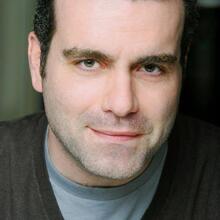The Sarah Silverman Program” just began its third season on Comedy Central and no one seemed to notice. Two years ago Silverman was lower-case comedy’s “It” girl, with her unblinking assault on societal taboos and subversion of the sitcom genre, all delivered in a kewpie-doll voice. She was the pinup girl for metahumor.
But those halcyon days seem far away, and Sarah and crew are now just another set of journeymen comics punching the clock in the relative obscurity of basic cable programming. While Silverman attempts to squeeze the last vestiges of humor from her anemic shtick, a seemingly endless parade of writers dedicated to savagely decimating all things film and television spills forth from that veritable cornucopia of pedestrian fare: the Internet. All these bloggers aspire toward the same end, that is, to attain a semblance of the notoriety and influence held by the mother of all sarcastic blogs: “Television Without Pity.”
“Silverman” and “TWOP” are two of the more prominent examples of snark, which originally began as a comedic sub-genre whose roots can be primarily traced to new media and the resultant mass accessibility of public forums. It has quickly gestated into a cultural epidemic.
While not everyone is familiar with the term snark, anyone who has been conscious in the last few years has felt its effects. Snark is the final frontier for the age of irony, the last word for a generation that prides itself on having the last word. Snark manifests itself in myriad ways, but at its core, is fundamentally a savage critique of dubious merit on everything and anything, put forth for the sole purpose of garnering laughs, or at least a mild guffaw or two.
Snark appeals because it can be done by almost anyone, because what little intellectual aptitude it requires is of the broadest sort and lacks any depth. Proponents of snark such as the folks at “Television Without Pity” fancy themselves to be the cultural descendants of Dorothy Parker, Alexander Woollcott and the other denizens of Algonquin Round Table, whose scathing cultural observations became the stuff of legend. But can one really compare a smart critique of the writing of Fitzgerald with a venomous critique of the writing of an episode of “Grey’s Anatomy?”
Therein lies the problem: Snark is the glorification of the mediocre. Unlike the traditional comedic paradigm wherein a low status character topples the high status “sacred cow” (think Chaplin’s Little Tramp and his wealthy antagonists), in snark the mid-level attacks the lower status; essentially the comedic equivalent of kicking a three-legged puppy.
Silverman is perhaps the most notable perpetrator of such mean-spirited commentary. Her continual abuse of minorities, the homeless and other marginalized peoples, while originally perhaps an inevitable backlash in an era awash in political correctness, now seems only funny in that uncomfortable way that a drunken uncle is on Christmas Eve.
While some might argue (including Silverman herself) that she is only portraying a character and is making fun of people who hold such beliefs—a sort of Gen-X Archie Bunker—the construction of the show and her supporting actors are not strong enough to make such a conceit work. Silverman is her show; the secondary characters have no flesh and serve no other purpose than to be steamrolled by Silverman and her enormous persona. This leaves her with no foil to buffer her idiocy; there is no Meathead to be the voice of reason to her Archie, no one to offer her comeuppance when she crosses the line and as such the show becomes no more than a tedious exercise in schadenfreude.
“Television Without Pity” is informed by the same conceit, that is, that it is really funny to watch the mediocre mock the less fortunate. Except in this case the less fortunate are the affluent purveyors of primetime television. “TWOP” provides weekly summations of the most significant television fare, complete with sarcastic jibes aimed at everything from plot devices to character’s apparel. While no one would argue that those involved in the dissemination of popular film and television deserve our sympathy, there is an element of redundancy about “TWOP” that speaks of unoriginality and laziness.
In other words, who doesn’t know that the writing on “Gossip Girl” is sophomoric and unrealistic? Who doesn’t realize that the contestants and judges on “America’s Next Top Model” have misplaced priorities? After a while all of the reviews begin to bleed into one another, and what you’re left with is a big pile of dull blades.
The bottom line for “The Sarah Silverman Program” and “Television Without Pity” is its bloodlessness. Comedy, at its nadir, is a robust venture, chocked full of truth, joy and suffering. It can bring vitality to even the most desolate of situations. Great comic minds such as Charlie Chaplin, Peter Sellers and Richard Pryor were able to find beautiful truths in a universe of pain. What Silverman et. al. have to offer is nothing remotely resembling that: For them there is no life, no breadth, no weight, only forced, stuttering gasps.
Snark Attack: Television and criticism in an age of nihilism
The latest from america
A Reflection for the Memorial of St. Athanasius, Bishop and Doctor of the Church, by J.D. Long García
A Homily for the Third Sunday of Easter, by Terrance Klein
In a pre-conclave meeting, an Italian cardinal, and backer of Cardinal Parolin as next pope, attacked Pope Francis for opening positions of responsibility in the church to men and women not in holy orders.
As the film’s title promises, there is plenty of sin on display, even before the vampires arrive.









I don't think you actually read TWOP, if you did you'd understand the love the recappers usually have for their subject and the love readers have for television in general. Just going into the forums you can see people who take their comedy and their dramas seriously, but just don't take themselves so seriously. When I read a recap of the shows I watch, I often come away seeing some broader cultural truth in the shows I'm watching. Take any Doctor Who recap and you'll find a meditation on Grace and transformation of the soul. Yes, the snark is there, but if you look beyond the surface, there is a lot more to it than that.
I also think the problem is much bigger than you make it out to be. It is a pervasive structural problem of comedy, particularly tied to the comedy of sarcasm popularized by '90s SNL and carried on by its alumni, like Tina Fey in the promo for Seinfeld's "The Marriage Ref", which itself promises even more snark. So much of comedy is based, as you acknowledge, on tearing someone else down. The morality here is tricky: is it ok to satirize politicians and corporations, but not the homeless and poor? Really, very few variations on satire are very appealing or moral, though occasionally a brilliant voice makes it worthwhile - Vonnegut, Stoppard, DeLillo - often by satirization of a (usually very broad) group in which they are included.
That said, there are fascinating currents in comedy today that are moving away from snarkiness and sarcasm, particularly Apatowian foul-mouthed comedy of awkwardness. The recent success of _The Hangover_ displays the growth of this kind of comedy from the pure awkwardness of Zach Galifianakis's character and the flatness of Ken Jeong's into a solid to the surprisingly realistic characters in the other leads whose dynamic natures form a familiar bildungsromanlich structure among the unbridled puerility of the subject matter. Still, despite the familiar elements, the comedy of _The Hangover_ is not aimed at individuals, groups, or even stereotypes, but at the foibles and stupidity that are our collective nature.
Comedy is shockingly complicated moral ground, but fortunately, comedy is not dead yet.
I don't put TWOP and Sarah Silverman in the same league. There are too many folks from all over to lump all of TWOP into the snark category, although snark can thrive there. I do not even despise snark. What I do hate is 'funny' that is not. Occasionally Sarah Silverman can be quite pointed, but mostly I find her to be in a cocoon of self that does not quite leave me in stitches. The faux-racism commentary might be seen as edgy by some, but it just leaves me on edge, with no countervailing laughs. I wonder if we are entering a time when culturally agreed-upon humor is not to be found. I find a lot of what is posted on YouTube to be nothing but sadistic, and lots that shows up at the church of celebritology is just schadenfreude. On the other hand, Craig Ferguson can make me laugh 'til I weep. Then again, as he has observed, he is just an immigrant doing a job no true American wants.